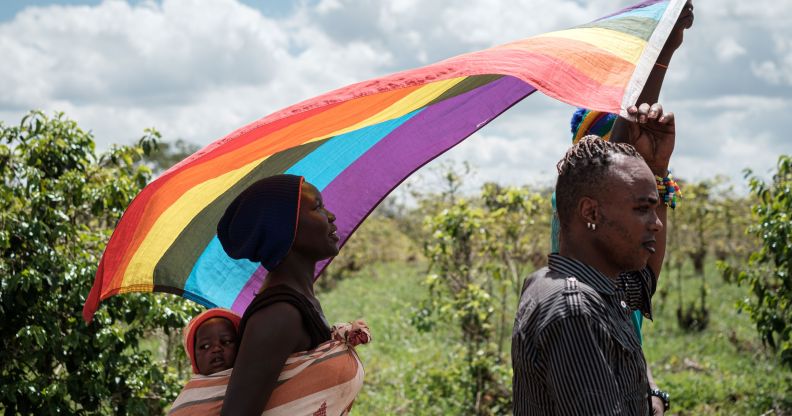Muslim LGBT refugees more likely to get asylum if they conform to ‘gay lifestyle’

LGBT+ refugees protest outside of the UNCHR building. (Yasuyoshi Chiba/Getty)
Muslim LGBT+ refugees in Germany are more likely to be granted asylum if they conform to Western stereotypes of what it means to be queer, according to a new study.
The latest research carried out by Mengia Tschalaer, a research fellow at the University of Bristol, focused on queer Muslim migrants in Germany and found that they had a better chance of being given asylum if they could show officials that they visited gay bars and Pride parades, which the academic linked to Western idealisations of LGBT+ identities.
The study, published online on Wednesday (July 24) in the Ethnic and Racial Studies journal, was based on interviews with 15 LGBT+ asylum seekers and refugees from Tunisia, Syria, Lebanon, Iran, and Pakistan.
“The most intelligible LGBT asylum stories conform to Western stereotypes about a particular ‘gay lifestyle’ that includes visiting gay bars, participating in lesbian and gay groups, and Gay Prides,” writes Tschalaer in the report, titled Between queer liberalisms and Muslim masculinities: LGBTQI+ Muslim asylum assessment in Germany.
LGBT+ Muslim refugees have better chance of getting asylum if they can prove they’ve been to gay bars, finds study
According to the United Nations, nearly 1.6 million refugees were registered in Germany between 2015 and 2018.
While there are no official records on the number of LGBT+ refugees in Germany, the report noted that one lesbian and gay association in Cologne estimated that, out of the 1.6 million figure, there are around 60,000 LGBT+ individuals from Syria, Iraq, Afghanistan, Yemen, Sudan, Uganda, and Algeria.
“The model of Western homosexuality is thus racialized and relies on culture-specific stereotypes which need to be confirmed through the sexual asylum story,” adds the research fellow.
Tschalaer goes on to quote Ibrahim Mokdad, an LGBT+ activist from Lebanon, who was granted refugee status in Germany in 2015.
“Your asylum story needs to be well prepared and tailored to the institutional expectations around sexuality and gender identity,” Mokdad is recorded as saying in the publication.
The model of Western homosexuality is thus racialized and relies on culture-specific stereotypes which need to be confirmed through the sexual asylum story.
“He [the decision-maker] has to believe that you are gay so you have to tell them your story so they can understand.”
Another refugee, Rzouga Selmi, who is non-binary and originally from Tunisia, meanwhile, is recorded as saying in the report that the successful “sexual asylum story” needs to reflect an “international image of the gay,” which includes being “flamboyant” and “outspoken.”
Officials need to stop focusing on Western notions of LGBT+ people, says study

According to the United Nations, nearly 1.6 million refugees were registered in Germany between 2015 and 2018. (UYGAR ONDER SIMSEK/AFP/Getty Images)
Concluding her report, Tschalaer argues that officials need to have a greater understanding of the many different ways in which people can be LGBT+, instead of just viewing asylum seekers through a Western lens.
“Credibility should be established in an individualised and sensitive manner and based on the applicant’s personal feelings, experiences of difference, stigma, and shame rather than Western idealisations of queer/gay sex, love, and lifestyle,” she writes.
The academic adds: “Actors involved in the asylum decision-making process must develop a reflexive approach to queer asylum that allows them to recognize stereotypes they might have in regard to homosexuality, race, and gender so as not to reproduce colonial and imperialistic narratives of vulnerability, sex, and desire.”

